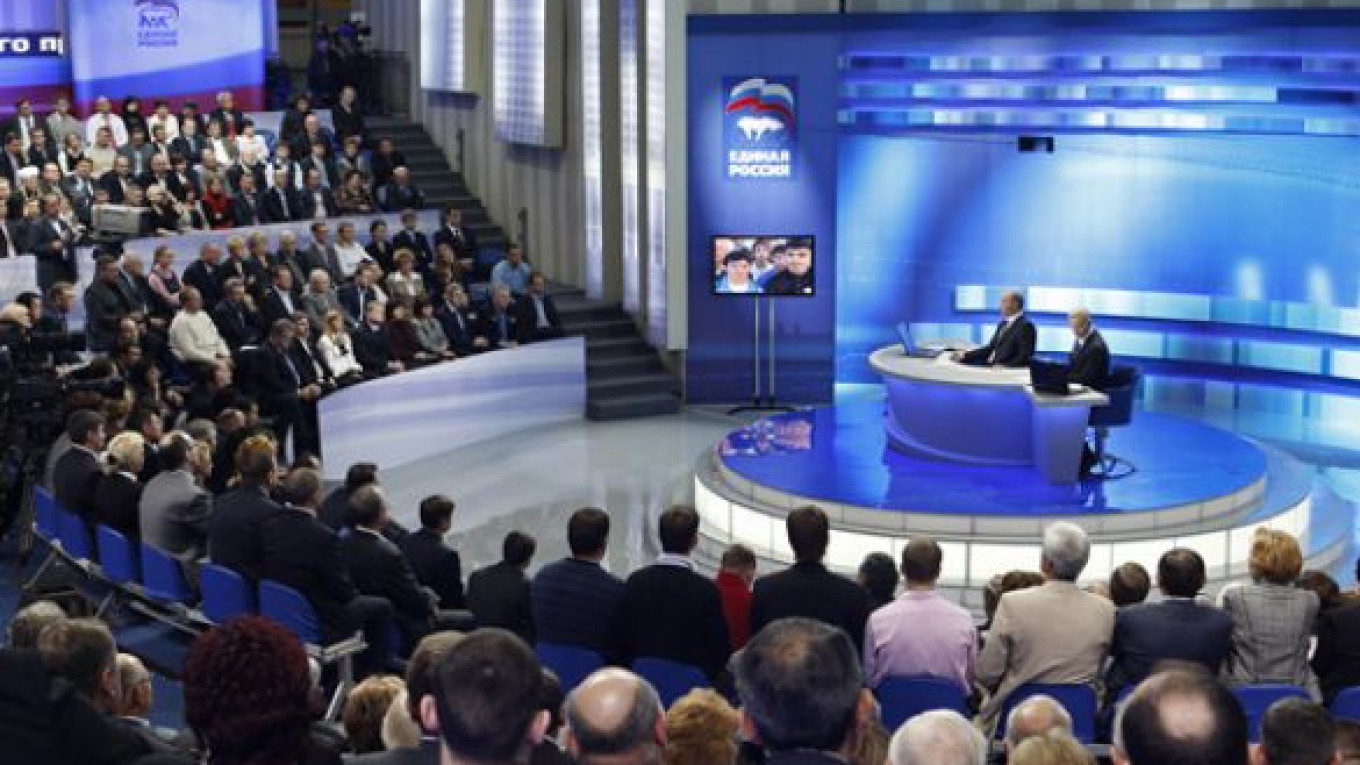President Vladimir Putin has postponed his annual call-in show on state television to the summertime, so that participants’ “ears and feet” won’t freeze, his spokesman said Wednesday.
Putin will also revive the tradition of large annual press conferences, but no date for this has been set, Kremlin spokesman Dmitry Peskov said in comments carried by Interfax.
The announcement, made in the late afternoon, followed a report that the TV show had been canceled and would be replaced by a news conference.
Peskov told Kommersant in an interview published Wednesday that the show would be replaced “by a new format” this year. Asked what kind of format that would be, the spokesman merely said it would be announced “in an appropriate way.” The newspaper also said Putin might hold a news conference at the end of this month, citing no one.
Peskov’s about-face comes amid reports that Putin is suffering from back trouble that requires surgery.
Speculation was fueled after the Kremlin canceled foreign visits. Last week, the executive committee of the Commonwealth of Independent States said it had postponed a summit planned in Turkmenistan this Friday. Earlier in October, Putin reportedly failed to travel to Pakistan for a four-nation summit on Afghanistan as well as make an expected trip to Turkey, although the excursions had not been officially announced.
Peskov also said on Oct. 17 that Putin would minimize his Kremlin appointments and stay in his Novo-Ogaryovo residence to not disrupt Moscow traffic.
However, the spokesman has denied the health rumors and said Putin did not plan to take time off. He told Reuters last week that Putin had been seen limping at the Asia-Pacific summit in Vladivostok because of a “sports injury.”
Putin had held the call-in show every year since 2001, usually in December. Last year’s program, aired on Dec. 15, lasted 4 1/2 hours and drew almost 40 percent of Russian television viewers. The carefully choreographed show always featured groups of factory workers or selected citizens, many of whom waited hours in the cold to get a chance for a question.
Peskov said Wednesday that the show would be moved to the warmer period of the year due to current “climatic conditions.”
According to media reports, members of Putin’s press team and state television producers meticulously rehearsed citizens’ questions, including one by an elderly female caller in 2007 who said “thank God” for Putin’s existence.
During last year’s show, Putin famously compared the white ribbons worn by opposition sympathizers to “condoms” and suggested that participants had been paid for participating in the mass protests against him. He also promised viewers that he would be do another show when re-elected as president.
Confronted with the report of the cancellation, analysts agreed that the show was outdated. Olga Kryshtanovskaya, a well-known sociologist who currently works as a Kremlin adviser, said that after running for a decade it was time to change the format. “All interest dies down after some time,” she told The Moscow Times.
Alexei Makarkin of the Center for Political Technologies said a news conference would be easier to use for PR purposes because there was too little positive news this year. He argued that because of looming budget cuts, in a live show Putin would have to give “frustrating answers” on burning issues like pension reform, housing and utility services.
Putin gave huge annual news conferences during his first two terms as president, where he used to vent his anger at the media. The last one, in February 2008, lasted four hours and 40 minutes. After he became prime minister that May, his successor in the Kremlin, Dmitry Medvedev, preferred to speak to citizens through video addresses, blogs and interviews to selected media outlets.
Medvedev gave a single such news conference in May 2011, in which he disappointed journalists who had hoped he would announce a presidential bid. National media speculated afterward that his original plan to do so was foiled by Putin’s formation of the All-Russia People’s Front, which effectively rallied the political elite to support his candidacy and was founded just after Medvedev’s news conference was announced.
Kommersant also reported that Putin’s first state-of-the-nation address, which is traditionally held by the president in November, might be postponed amid continued disputes about its content.
“Because this is the new president’s first address, it cannot be just passable,” the newspaper quoted a Kremlin source as saying. It added that “it must be carefully and conceptually crafted to contain a very serious strategic direction.”
Related articles:
A Message from The Moscow Times:
Dear readers,
We are facing unprecedented challenges. Russia's Prosecutor General's Office has designated The Moscow Times as an "undesirable" organization, criminalizing our work and putting our staff at risk of prosecution. This follows our earlier unjust labeling as a "foreign agent."
These actions are direct attempts to silence independent journalism in Russia. The authorities claim our work "discredits the decisions of the Russian leadership." We see things differently: we strive to provide accurate, unbiased reporting on Russia.
We, the journalists of The Moscow Times, refuse to be silenced. But to continue our work, we need your help.
Your support, no matter how small, makes a world of difference. If you can, please support us monthly starting from just $2. It's quick to set up, and every contribution makes a significant impact.
By supporting The Moscow Times, you're defending open, independent journalism in the face of repression. Thank you for standing with us.
Remind me later.


